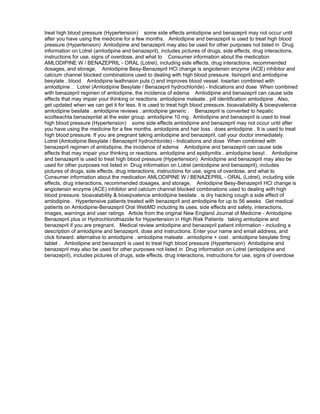
amlodipine/benazepril – oral, Lotrel
Medication Uses How To Use Side Effects Precautions Drug Interactions Overdose Notes Missed Dose Storage WARNING: This drug can cause serious harm (possibly fatal) to an unborn baby if used during pregnancy. Therefore, prevent pregnancy while taking this medication. Consult your doctor for more details and to discuss the use of reliable birth control while taking this medication. If you are planning pregnancy, become pregnant, or think you may be pregnant, contact your doctor immediately. USES: This medication is a combination of two drugs: a calcium channel blocker (amlodipine) and an ACE inhibitor (benazepril). It is used to treat high blood pressure (hypertension). It works by relaxing blood vessels so that blood can flow more easily. Lowering high blood pressure helps prevent strokes, heart attacks and kidney problems. HOW TO USE: Read the Patient Information Leaflet if available from your pharmacist before you start taking this medicine. If you have any questions, ask your doctor or pharmacist. Take this medication by mouth with or without food as directed by your doctor, usually once daily. The dosage is based on your medical condition and response to treatment. Use this medication regularly to get the most benefit from it. To help you remember, take it at the same time each day. Continue taking this medication even if you feel well. Most people with high blood pressure do not feel sick. It may take 1 to 2 weeks before you get the full benefit of this medication. Tell your doctor if your condition does not improve or worsens (such as your blood pressure readings remain high or increase). SIDE EFFECTS: Dizziness or light-headedness may occur as your body adjusts to the medication. Dry cough or swelling hands/ankles/feet may also occur. If any of these effects persist or worsen, tell your doctor or pharmacist promptly. To reduce the risk of dizziness and lightheadedness, get up slowly when rising from a sitting or lying position. Remember that your doctor has prescribed this medication because he or she has judged that the benefit to you is greater than the risk of side effects. Many people using this medication do not have serious side effects. Tell your doctor right away if any of these serious side effects occur: fainting, fast/irregular/pounding heartbeat, symptoms of a high potassium blood level (such as muscle weakness, slow/irregular heartbeat), change in the amount of urine, signs of infection (such as fever, chills, persistent sore throat). This drug may rarely cause serious (possibly fatal) liver problems. Tell your doctor right away if you notice any of the following serious side effects: yellowing eyes or skin, dark urine, severe stomach/abdominal pain, persistent nausea. Some people with severe heart disease may rarely develop worsening chest pain or a heart attack after starting this medication or increasing the dose. Get medical help right away if you experience: worsening chest pain, symptoms of a heart attack (such as chest/jaw/left arm pain, shortness of breath, unusual sweating). A very serious allergic reaction to this drug is rare. However, get medical help right away if you notice any symptoms of a serious allergic reaction, including: rash, itching/swelling (especially of the face/tongue/throat), severe dizziness, trouble breathing. This is not a complete list of possible side effects. If you notice other effects not listed above, contact your doctor or pharmacist. In the US – Call your doctor for medical advice about side effects. You may report side effects to FDA at 1-800-FDA-1088. In Canada – Call your doctor for medical advice about side effects. You may report side effects to Health Canada at 1-866-234-2345.
PRECAUTIONS: Before taking this medication, tell your doctor or pharmacist if you are allergic to amlodipine or benazepril; or to other dihydropyridine calcium channel blockers (such as nisoldipine, nifedipine); or to other ACE inhibitors (such as captopril, lisinopril); or if you have any other allergies. This product may contain inactive ingredients, which can cause allergic reactions or other problems. Talk to your pharmacist for more details. Before using this medication, tell your doctor or pharmacist your medical history, especially of: history of an allergic reaction which included swelling of the face/lips/tongue/throat (angioedema), blood filtering procedures (such as LDL apheresis, dialysis), liver disease, a certain structural heart problem (aortic stenosis), collagen vascular disease (such as lupus, scleroderma). This drug may make you dizzy. Do not drive, use machinery, or do any activity that requires alertness until you are sure you can perform such activities safely. Limit alcoholic beverages. Too much sweating, diarrhea, or vomiting may cause loss of too much body water (dehydration) and increase your risk of lightheadedness. Report prolonged diarrhea or vomiting to your doctor. Be sure to drink enough fluids to prevent dehydration unless your doctor directs you otherwise. Before having surgery, tell your doctor or dentist about all the products you use (including prescription drugs, nonprescription drugs, and herbal products). This product may increase your potassium levels. Before using potassium supplements or salt substitutes that contain potassium, consult your doctor or pharmacist. Older adults may be more sensitive to the side effects of this drug, including dizziness, increases in potassium level, and unusual change in the amount of urine (kidney problems). This medication is not recommended for use during pregnancy. It may harm an unborn baby. Consult your doctor for more details. (See also Warning section.) Benazepril passes into breast milk. It is unknown if amlodipine passes into breast milk. Consult your doctor before breast-feeding. DRUG INTERACTIONS: See also Precautions section. Drug interactions may change how your medications work or increase your risk for serious side effects. This document does not contain all possible drug interactions. Keep a list of all the products you use (including prescription/nonprescription drugs and herbal products) and share it with your doctor and pharmacist. Do not start, stop, or change the dosage of any medicines without your doctor’s approval. Some products that may interact with this drug include: aliskiren, lithium, drugs that may increase the level of potassium in the blood (such as ARBs including losartan/valsartan, birth control pills containing drospirenone), gold injections. Check the labels on all your medicines (such as cough-and-cold products, diet aids, or NSAIDs such as ibuprofen, naproxen) because they may contain ingredients that could increase your blood pressure. Ask your pharmacist for more details. A very serious reaction may occur if you are getting injections for bee/wasp sting allergy (desensitization) and are also taking benazepril. Make sure all your doctors know which medicines you are using.
QUESTION
OVERDOSE: If overdose is suspected, contact a poison control center or emergency room immediately. US residents can call their local poison control center at 1-800-222-1222. Canada residents can call a provincial poison control center. Symptoms of overdose may include: severe dizziness, fainting, and unusually fast or slow heartbeat. NOTES: Do not share this medication with others. Lifestyle changes such as stress reduction programs, exercise and dietary changes may increase the effectiveness of this medicine. Talk to your doctor or pharmacist about lifestyle changes that might benefit you. Laboratory and/or medical tests (such as kidney function, potassium levels) should be performed periodically to monitor your progress or check for side effects. Consult your doctor for more details. Check your blood pressure regularly while taking this medication. Learn how to monitor your own blood pressure at home, and share the results with your doctor. MISSED DOSE: If you miss a dose, take it as soon as you remember. If it is near the time of the next dose, skip the missed dose and resume your usual dosing schedule. Do not double the dose to catch up. STORAGE: Store at room temperature away from light and moisture. Do not store in the bathroom. Keep all medications away from children and pets. Do not flush medications down the toilet or pour them into a drain unless instructed to do so. Properly discard this product when it is expired or no longer needed. Consult your pharmacist or local waste disposal company for more details about how to safely discard your product. Information last revised March 2014. Copyright(c) 2014 First Databank, Inc.
Report Problems to the Food and Drug Administration
You are encouraged to report negative side effects of prescription drugs to the FDA. Visit the FDA MedWatch website or call 1-800-FDA-1088.
Selected from data included with permission and copyrighted by First Databank, Inc. This copyrighted material has been downloaded from a licensed data provider and is not for distribution, except as may be authorized by the applicable terms of use.
CONDITIONS OF USE: The information in this database is intended to supplement, not substitute for, the expertise and judgment of healthcare professionals. The information is not intended to cover all possible uses, directions, precautions, drug interactions or adverse effects, nor should it be construed to indicate that use of particular drug is safe, appropriate or effective for you or anyone else. A healthcare professional should be consulted before taking any drug, changing any diet or commencing or discontinuing any course of treatment.
CONDITIONS OF USE: The information in this database is intended to supplement, not substitute for, the expertise and judgment of healthcare professionals. The information is not intended to cover all possible uses, directions, precautions, drug interactions or adverse effects, nor should it be construed to indicate that use of particular drug is safe, appropriate or effective for you or anyone else. A healthcare professional should be consulted before taking any drug, changing any diet or commencing or discontinuing any course of treatment.


